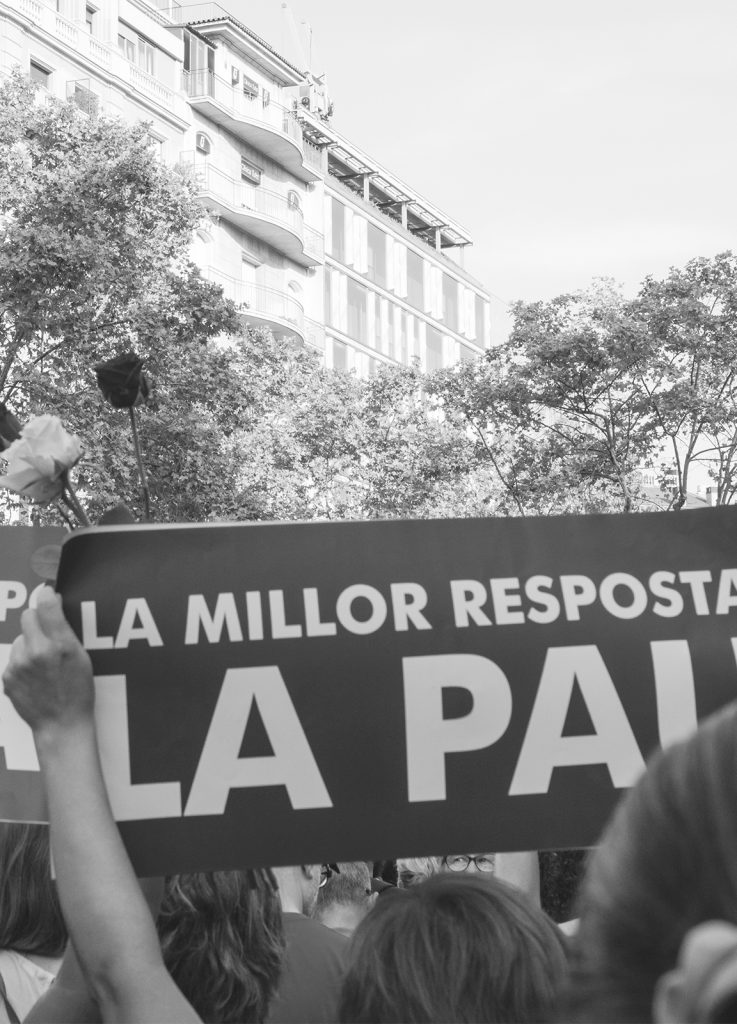In the era of post-truth, brought along by emotive populism which leads to a constant perversion of language, words have become flexible and are being twisted to an extreme extent, losing their original meaning due to excessive use or manipulation, whether intentional or not. For this reason, we believe it is suitable to avoid, as much as possible, conceptual ambiguities, in order to contribute to the definition of narrative limits. This new edition of the magazine Peace in Progress is launched with the intention of entering into the analysis of one of the words that constitute part of the hard core of what we could call the peace lexicon: nonviolence, a term which, recently, has been appearing quite often in the media, in informal conversations, debates, banners and even legal resolutions.
This is not the first time a monograph of Peace in Progress is dedicated to nonviolence. We already addressed this topic in issue number 7 (2011), but in that occasion, we intended to give a general overview of the Catalan tradition in favour of nonviolence, without any concrete chronological focus.
In fact, this monograph was also born with the aim of stimulating knowledge and critical reflection on experiences of nonviolent struggles, but from a different contextual perspective: in recent years, Catalonia has gone through an intense social and political debate and process, linked to the right to self-determination and the independence of Catalonia, which has set the scene for a wide range of events and promoted several actions of citizens’ mobilisation. This process has generated a socio-political turmoil which is of direct concern for us: the initials of ICIP are specific and stand for being International, in favour of Peace, but also for being Catalan, and we cannot obviate a reality which is so nearby. As such, for the first time since this magazine was founded, the focus will not be put on geographically remote locations. The exceptionality of the context that surrounds us compels us to analyse it.
We are International, in favour of Peace and Catalan: the exceptionality of the context that surrounds us compels us to analyse it
At this point, we believe it is important to highlight that this monograph does not take any political position. Based on our plurality and ethical non-indifference, it is our priority to highlight a palpable evidence: civil society, through different outlets, has repeatedly defended a socio-political process that uses nonviolence as a mechanism of identification to materialise a project for a future of social change. This choice in favour on nonviolent action directly invites us to start a joint, more serene and deeper reflection on different elements that revolve around a project of radical transformation of society in all its dimensions: personal, relational and, also, structural. The motivation of this monograph lies, as such, in analysing the Catalan context with respect to the active and committed positions that have been adopted, rejecting all demonstrations of violence, thereby emphasising the positive project, promoted by nonviolence. This analytical approach, from different perspectives of the phenomenon, has allowed us to demonstrate that the conflict and the will to change can be channelled in a constructive manner, far from being passive, submissive or conformist. Therefore, this is not a matter of focussing on the content of the Catalan independentist process, but rather of the shape it has taken, in which it has been built on different initiatives and tools of peaceful civil resistance and, also, on disobedience.
In the first article, David Cortright offers us an analysis of the movement in favour of Catalan independence through a review of the principles of strategic nonviolence and the classic methods of mass mobilisation used by Gandhi, Martin Luther King Jr. and other pioneers of civil resistance strategy. Subsequently, Jordi Mir contextualises the evolution of activism in Catalonia and invites the reader to reconsider matters such as legality and legitimacy, especially regarding what they do for the acceptance or criminalisation of nonviolent civil disobedience.
The choice in favour on nonviolent action directly invites us to start a serene and deep reflection on different elements that revolve around a project of radical transformation of society
Beyond the reflections of a more theoretical nature, the monograph also addresses concrete experiences more in detail. With the aim of giving visibility to the peaceful component of the different popular initiatives that have been arising in the defence of liberty, democratic values and human rights, Marina Llansana and Sandra Saura highlight, in their respective articles, the creation of a range of collectives, organisations and campaigns which have promoted the nonviolent character in all the mass mobilisations and rallies in the framework of the Catalan socio-political conflict. From his side, Pedro Mª Uruñuela bases his article on conflict theory to demonstrate the urgency of breaking the vicious circle of polarisation which feeds on a lack of reflection and a high degree of disinformation. The article becomes a decalogue of key tools, ranging from cooperation, dialogue, active listening, the recognition of legitimacies, mutual understanding and the respect for other people’s feelings, in order to minimise all possibilities of social division.
Finally, we highlight the weight that social networks have nowadays and the role they play as tools for the promotion of citizen organisation and collective action, starting from an interview with activist Simona Levi, focussing on the strategic use of digital tools and how they can contribute to the renewal of participative democracy.
To finish, we want to dedicate this monograph to two beloved people who have recently passed away: Jaume Botey, teacher, friend and collaborator of ICIP, a reference in the fight for dignity and justice and a key figure of the history of the Catalan Peace movement; and Gene Sharp, one of the main references in the research on peace and nonviolence at an international level. Thank you both for all you have taught to us.
Photography : Demonstration «No tinc por» in Barcelona, August 2017: Mariusmm.
© Generalitat de Catalunya
